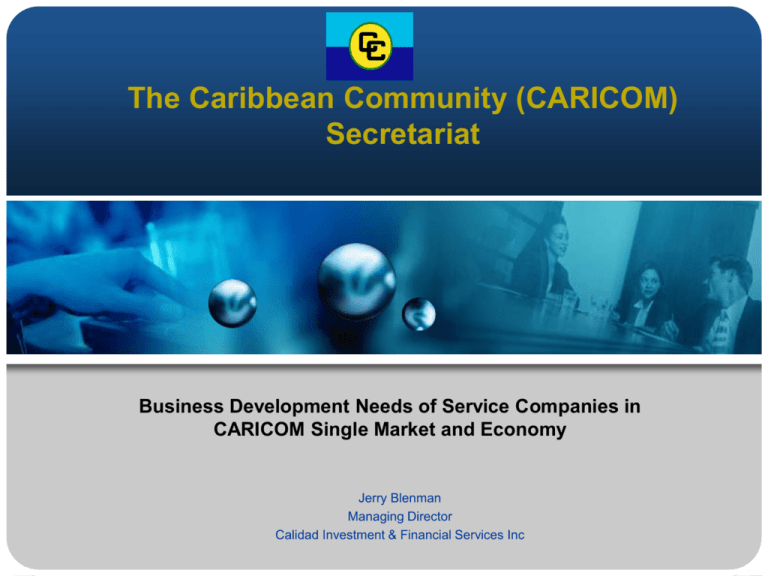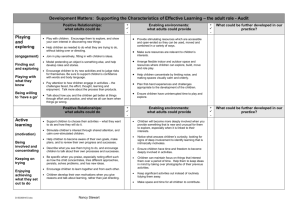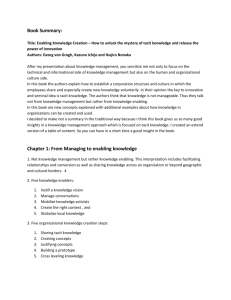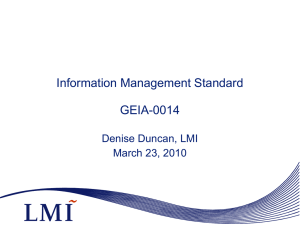
The Caribbean Community (CARICOM)
Secretariat
Business Development Needs of Service Companies in
CARICOM Single Market and Economy
Jerry Blenman
Managing Director
Calidad Investment & Financial Services Inc
Introductory Comment
Expansion and fortification of the services
economy within CARICOM is an issue of
pressing importance meriting…
•Immediacy of attention
•Continuous assessment and
•An enabling policy framework
significance to the region.
reflective
of
its
Definition, Scope & Coverage
Broad
Definition
Key sectors
such as
tourism,
insurance and
financial
services are
very evident
players
Scope
1
Includes a
myriad of
downstream
professional,
recreational and
indigenous
value added
activities of
unequivocal
importance to
the region
Scope
2
Further defined
by a series of
sub-sectors,
reflective of a
set of highly
interrelated
entities.
Coverage
Functioning
across sectoral
lines and
jurisdictional
boundaries.
Situation Analysis
•
The sector is arguably the fastest growing in the region
•
The region’s future and unique opportunities for economic
growth are distinctly linked to its development and success
•
There is an absence of key enablers which practically take
account of issues such as fragmentation, size and the
capacity of some operations within the sector to effectively
compete on a global scale, far-less within the region.
•
Contextual factors which traditionally and have increasingly
been confronting it, range from political and legislative
changes to social and demographic trends as well as
Hurdles
–
–
–
–
rapid development of technology,
fluctuating economic conditions and
an unprecedented level of competitive rivalry.
an increasing operating cost framework higher than that of
extra-regional jurisdictions within proximity of its borders
Situation Analysis
• Future opportunities for the development of trade in
services are very favorable.
Opportunities
– Under the recently executed EPA, there is agreed market
access to over 90% of the European services sector by
the region in key areas such as Tourism, Business and
Professional, Entertainment, Financial, Communications,
Environmental, Construction, Transportation and
Distribution Services.
– More generous provisions under the EPA, than those
existing in previous trade agreements for temporary
movement of natural persons (Mode 4)
– Business and Professional Services – a myriad of
services under Mode 4 are becoming more and more
evident and relevant to trade in the region and the basis
for innovation, alliances and opportunities of
engagement in international markets.
Situation Analysis
• Future opportunities are very favorable.
– Tourism Services – very innovative forms of the tourism
product have emerged within recent times. However
Opportunities
• Though the sector accounts on average for annual revenue
of US$20 billion and 21.5 million stay-over visitors, it
represents less than 6% of international tourism receipts
and less than 3% of international stay-over visitors.
• The level of competitiveness in the industry has been very
high and particularly so where cost and quality rivalry in
some Latin American markets have played a key role in
diluting the effectiveness of the Caribbean’s tourism
product)
– Entertainment Services – the entertainment industry
represents huge prospects for the emergence of new
talent and the trade in services across sectoral, regional
and international boundaries.
Policy Framework
• Trade Agreements - Conduciveness of Environment
– In focus is the readiness of the sector and policy makers to
assess, address and effectively manage changes within the
region occasioned by global trade negotiations
– It is apparent that small economies and poor countries have
continued to experience difficulties in effectively actualizing
the globalization formula due to weak financial, economic and
technical capabilities
– Participants within the services sector however generally
recognize the importance
of existing agreements as well as
All in
existencedeliberations which are supportive of
the need for ongoing
overopportunities
20
reciprocal trading
within regional and global
years
markets
There is a need for increased dialogue with participating
entities in the sector as a standard policy making position
Policy Framework
• Trade Agreements - Conduciveness of Environment
– There is some evidence of the actualization of opportunities
emanating from such agreements particularly among some
mainstream participants inclusive of:
• Wider access to inter-regional and global markets
• Creation of new regional and global alliances – success in this
regard has primarily been in the areas of business, distribution
and educational services.
• Implementation of alternative and new forms of engagement,
buttressed by the restructuring of existing and creation of new
industries to meet global requirements.
• Access to some forms of technical assistance and probable
financing
Enabling Development and Growth of the
Trade in Services
Enabler 1 - Creation of Data and Business Intelligence Reservoirs
•
Among the contributing fundamentals to poor business health in the
region is
– the limited nature or absence of timely information
– the absence of formal business intelligence data repositories which
can be accessed and drawn on for analytical and planning purposes
The research capabilities of the region particularly as such
relate to innovation, the creation of new products and
competency building is weak
•
Encouraging alliances and establishment of business partnerships which
allow for cost effective harnessing and development of the regions
knowledge and research economy is an urgent imperative
•
Correction of this malady is of particular importance at the trade sector
level and can probably be best achieved through
– the strengthening of business support organizations (BSO), trade
associations or chamber of commerce bodies to collect data from
their constituent members.
Enabling Development and Growth of the
Trade in Services
Enabler 2 - Improving Structural Integrity
• The capacity of the region to produce international
services of a highly competitive nature requires further
development
• While significant global challenges are evident, it is
clear that strategies aimed at readying companies at
the domestic level to effectively embrace global
opportunities is critical.
• The issue of size is seemingly not as significant a
determinant to the creation of competitive advantage
by service practitioners as is the structural quality of
their operations
Enabling Development and Growth of the
Trade in Services
Enabler 2 - Improving Structural Integrity
Strategy and planning
Key considerations include
• Guidance on and structured approaches to the identification and
assessment of likely impacts of varying forms of organizational
risk.
• Exposure to the rudiments and processes for identifying and
developing contingency plans to allow for timely responses to
areas of organizational risk that are likely to affect their ability to
achieve stated objectives.
• Guidance on the implementation of risk management
programmes, including employment practices and indemnification
arrangements
Enabling Development and Growth of the
Trade in Services
Enabler 2 - Improving Structural Integrity
Succession planning
Key considerations include
• Exposure to recruitment and selection policies and processes
supportive of future organizational skills and competency
requirements.
• Assistance with programs and the creation of alliances that will
identify and feed new and potential talent.
• Particularly with small firms, guidance in the establishment of
systems supportive of the identification of successors and an
understanding of related legal processes
Enabling Development and Growth of the
Trade in Services
Enabler 2 - Improving Structural Integrity
Improved systems of internal governance
Key consideration include
• Systems supportive of good record keeping and the production of
timely audit reports
• Systems supportive of the implementation of physical and
financial asset protection policies inclusive of risk management
policies and rules.
• Systems supportive of the establishment of corporate citizenship
and business etiquette commitments.
Enabling Development and Growth of the
Trade in Services
Enabler 2 - Improving Structural Integrity
Control and monitoring systems
Key consideration include
• Assistance with the implementation of organizational benchmarks
to assist with the gauging of performance
• Assistance with the establishment and implementation of
guidelines for monitoring and assessing market and competitor
activity
Enabling Development and Growth of the
Trade in Services
Enabler 3 - Creating Operational Management Efficiencies
• Building operational management competencies defined
principally on the capacity of entities in the services economy to
create value for existing and potential clients within the framework
of current and proposed service and product offerings is an
indispensable concern that continues to severely undermine cost
effectiveness and competitiveness of the sector.
• The operational management capacity of several entities in the
sector is fundamental to their sustainability and hence the
maintenance of a platform that optimizes operational efficiency is
an imperative
Enabling Development and Growth of the
Trade in Services
Enabler 3 - Creating Operational Management Efficiencies
Among the key consideration for development are:
• The creation of policies and procedures that are well documented in the
form of policy statements and manuals to guide staff in the execution of
their duties.
• The development of systems and documented guidelines for conducting
periodic checks for conformance to policies and procedures of operational
functions
• Mechanisms for monitoring and fulfilling statutory commitments and
enablement of prompt reporting, a high level of transparency and
disclosure
• Support in the establishment of procedures for identifying and addressing
organization wide preventative maintenance issues and standby systems
to control and minimize disruptions to operations and service delivery in
the event of specified failures.
Enabling Development and Growth of the
Trade in Services
Enabler 4 - Improving Relevance, Versatility & Quality of Services
• Success continues to be anchored on the ability of entities in the
region to design, develop, and deliver services that meet the
needs of regional and global markets.
• Emphasis on development of competencies that allow for
continuous improvement, through research, design, and
development is therefore important
• Complimentary to this is the need for marketing processes at the
trading level which are intrinsic to profitable identification,
anticipation and satisfaction of consumer needs.
Enabling Development and Growth of the
Trade in Services
Enabler 4 - Improving Relevance, Versatility & Quality of Services
Specifics for advancing these areas include:
• Facilitation of systems and development of guidelines to ensure products
and services meet international standards with a view to competing in
other destinations with world rated products and services.
• Establishment of measures that will assist in building services export
competitiveness while creating linkages with foreign affiliates for the
promotion and sale of the sectors’ products and services
• Facilitation of opportunities that provide for exposure of service delivery
and sales staff to training on techniques that will assist them in delivering
world class service
• Assistance with the establishment of cost and pricing strategies for
products and services that will provide opportunities to compete in
markets outside of the region
• Assistance with the creation of distinct product and service brands with
the capacity for franchising in regional and international markets.
Enabling Development and Growth of the
Trade in Services
Enabler 5 - Improvements in Quality Management
• The issue of quality is a sensitive subject throughout the region. It
is also a major industry wide concern.
• If the region is to become more competitive, the quality concerns
particularly as they relate to the value of service delivered
comparative to that of competing entities external to the region
must be addressed.
• Importantly, the fast tracking of a regional wide quality code which
attends to the sectoral and cross-sectoral concerns supported by
a series of international benchmarks stands out as a fundamental
of immense importance to progressively differentiating and
improving the regions’ competitiveness.
Enabling Development and Growth of the
Trade in Services
Enabler 5 - Improvements in Quality Management
Technical assistance in respect of the following has been identified:
•
Improvements in the performance and features of services being offered
to ensure they have the ability to meet required needs
•
Assistance in the establishment and maintenance of Quality Management
Systems (QMS) as a prerequisite and key operational feature for ensuring
formal methods of control, feedback, and client satisfaction is attended to.
•
It is notable as well that while the Caribbean Regional Organization on
Standards and Quality (CROSQ) has apparently been engaging in work
towards improving quality standards for goods and services, very few
business entities are aware of them and their effort. The fostering of
relations between these important entities and the business community
as well as the soliciting of input into proposed standards is important.
Enabling Development and Growth of the
Trade in Services
Enabler 6 - Improving Technological Capacity
• The services economy for the most part is technologically driven
and substantially dependent on the information economy
• Competitiveness and efficient service delivery in many respects, is
challenged in the absence of an effective information and
communications technology (ICT) platform
• Advances in computer technology applications have had far
reaching effects on industries and their ability to capitalize on and
create competitive advantage through the implementation and
deployment of technology solutions as they develop
• More importantly is the issue of access into international markets
through the sale of services using technology which in some
respects has been very cost prohibitive.
Enabling Development and Growth of the
Trade in Services
Enabler 6 - Improving Technological Capacity
Emerging issues of importance for consideration include:
•
The need to establish a regional master plan as a matter of strategic
priority for effective automation of all key industries. Phased
implementation should be considered and the risk of obsolescence
should be central to the automation efforts to avoid significant capital
outlay that would only be beneficial in the short to medium term.
•
Support in the development and implementation of technological
development and maintenance policies particularly in relation to storage
and restoration of data.
•
In support of improved regional data capture and analysis, systems that
will enhance and allow for access to real time information particularly in
critical areas such as financial and risk management reporting,
administration of human resources, and customer tracking inclusive of a
complaints management process are recommended.
Enabling Development and Growth of the
Trade in Services
Enabler 7 - Development & Optimization of Human Capital
• Among the key factors underpinning the success of the region is
its people
• The pace of change within the business community has been
rendering skill sets redundant at a faster rate than any previous
time in history, thereby weakening the effectiveness of the region’s
human resources and its ability to effectively respond to regional
and global developmental agendas
• Noting the high correlation between the regions’ success and the
quality of its human capital, there can be no doubt that factors
such as performance and productivity, if unattended will result in
sub-optimization of the services economy and negating of the
ideals of corporate transformation
Enabling Development and Growth of the
Trade in Services
Enabler 7 - Development & Optimization of Human Capital
Consideration include:
Inventory of current skills and skill gaps
Qualitative information on the level of competencies required
under various categorizations
Data on exits occasioning skills depletion and requiring
replacement skills.
Definition of regional recruitment and selection criteria that
strengthens the harmonization of a regional human resource
policy position & promotes a culture of service excellence and
continuous improvement while emphasizing performance based
schemes & successful implementation of management strategies.
Creation and access to a regional human resource data base
which among other things identifies and provides intelligence of
the sector’s labour market, its composition, challenges, as well as
labour market changes.
Enabling Development and Growth of the
Trade in Services
Enabler 8 – Development Creation of “Commercial Credit Unionism
• Within developing economies, like those of the Caribbean, the
limitation of methods which take account of the needs of emerging
entities, while cognizant of the dynamics of working and
developmental capital flows, is a socio-economic imperative of
critical importance to existing businesses and the facilitation of
start-ups
• The historical significance and success of credit unions as
financial intermediaries primarily attending to consumer type
financing is very evident.
• The extension of this success through the establishment of
Commercial Credit Unions, focused on economic development,
structuring and raising of capital and the provision of other
capacity building services to its members is of significant
importance at this juncture of our economic development in the
region.
Enabling Development and Growth of the
Trade in Services
Enabler 8 – Development Creation of “Commercial Credit Unionism
Why this type of structure?
• Credit union development has traditionally and continues to be
structured on distinguishing characteristics unlike those utilized to
formulate banks and other financial entities. Among the key
distinguishing characteristics are:
– Credit unions are member-owned, member-directed cooperatives in
which each member has and is entitled to one vote. In this regard
they are not subjected to control by any one shareholder and are
virtually invulnerable to hostile takeovers.
– As public service institutions their main purpose and intent of origin is
that of promoting thrift among members and creating a source of
credit for provident or productive purposes
Enabling Development and Growth of the
Trade in Services
Enabler 8 – Development Creation of “Commercial Credit Unionism
Why this type of structure?
– Credit unions do not operate for profit. Actually, enshrined in
the credit union philosophy is the term “not for profit, for
people”. As a result a significant portion of credit union
earnings are returned to members in the form of annual
dividends. The not for profit concept is also clearly expressed
in the beneficial pricing of services to members particularly
as it relates to fees, interest rates on loans and higher than
typical interest rates on deposits
–
Credit unions have certain limitations on their membership
based on member affinity or what is generally referred to as
the institutions “common bond.”
Enabling Development and Growth of the
Trade in Services
Commercial Credit Union Model
Operational
Nodes
Participating
Entities
Operational
Focus
Fund Sourcing Services
Node 1
Capitalization
Equity Investors
Venture Capitalist
Deposit Taking
Structuring & Sourcing of Capital
Small & Medium Enterprises
Development Services
Node 2
Enterprise
Development
Donor Agencies
Development Agencies
Consulting Firms
Node 3
Enterprise
Financing
Grant Financing
Training & Mentoring
Research & Development
Institutional Strengthening
Financing Services
Small & Medium Enterprises
Calidad Investment & Financial Services Inc © All Rights Reserved
Start up Finance
Working Capital Finance
Development Finance
IPO Structuring
Structural Requirements
Harmonization & Strengthening - Legislative Framework
• The framework for driving legislative change is not lacking.
• Wider cooperation on a harmonized legislative position is a major
hindrance to progressing the regional integration process and
optimization of a harmonized strategy for entering international
markets
• In the absence of effective protocols on key sectoral matters,
binding agreements between jurisdictions within the regional
community and workable treaties on how we handle our affairs as
a collective people, the economy of tomorrow is weakened and
will eventually lack relevance in a borderless market space.
This need not be the plight of the region
Structural Requirements
Harmonization & Strengthening - Government & Industry Structures
•
Adequate structures at the policy making and industry association levels
are required to give maximum effect to the capacity to truly assist the
business community to be effective participants in the regional and global
services economy (such can only be fully functional in an atmosphere of
harmonized governance)
•
At the governmental level on a state by state basis there is capacity to
treat with urgency varying matters; however within the context of the
CSME effective trading of services and a harmonized structure to guide
such is debatable
•
State led initiatives focused on the solidification of a harmonious and
progressive business climate buttressed by an integrative framework
which continuously attends to legislative and regulatory improvements as
key contributors to the creation of high performing service export driven
entities is of fundamental importance to the growth prospects of the future
services economy and indeed the region.
All in
existence
over 20
years
Thank You!
Q&A








